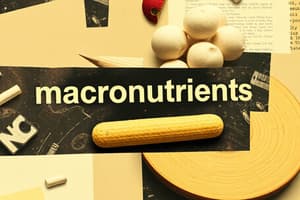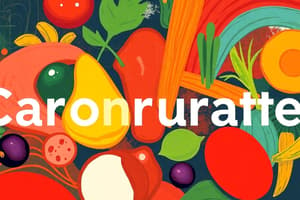Podcast
Questions and Answers
Which vitamin is known for supporting vision and organ function?
Which vitamin is known for supporting vision and organ function?
- Vitamin B
- Vitamin A (correct)
- Vitamin E
- Vitamin C
What is a function of Vitamin C in the body?
What is a function of Vitamin C in the body?
- Bone growth
- Wound healing and collagen formation (correct)
- Red blood cell formation
- Vision support
Which macromineral is primarily involved in muscle function and blood vessel contraction?
Which macromineral is primarily involved in muscle function and blood vessel contraction?
- Sodium
- Iron
- Magnesium
- Calcium (correct)
Which category of vitamins can be stored in the body?
Which category of vitamins can be stored in the body?
What is the main role of protein in the body?
What is the main role of protein in the body?
Which of the following is a trace mineral?
Which of the following is a trace mineral?
Which vitamin is categorized as water-soluble and is important for energy production?
Which vitamin is categorized as water-soluble and is important for energy production?
Which food source is a primary provider of Vitamin D?
Which food source is a primary provider of Vitamin D?
What is a significant factor that influences the nutrient needs of individuals?
What is a significant factor that influences the nutrient needs of individuals?
Why do females generally require higher iron levels compared to males?
Why do females generally require higher iron levels compared to males?
How many glasses of water are recommended for daily intake?
How many glasses of water are recommended for daily intake?
What is a key characteristic of hypotonic fluids?
What is a key characteristic of hypotonic fluids?
What is one effect of dehydration on the body?
What is one effect of dehydration on the body?
What can dark urine indicate about a person's hydration status?
What can dark urine indicate about a person's hydration status?
What role does hydration play in regard to appetite?
What role does hydration play in regard to appetite?
Which of the following is NOT considered a diuretic?
Which of the following is NOT considered a diuretic?
What is the primary purpose of carbohydrates in the diet?
What is the primary purpose of carbohydrates in the diet?
Which type of carbohydrates provides a quick source of energy?
Which type of carbohydrates provides a quick source of energy?
Which of the following nutrients is considered a macronutrient?
Which of the following nutrients is considered a macronutrient?
What characteristic distinguishes wholemeal carbohydrates from white carbohydrates?
What characteristic distinguishes wholemeal carbohydrates from white carbohydrates?
Which of the following statements is correct regarding fats?
Which of the following statements is correct regarding fats?
Which vitamin categories are fat-soluble vitamins?
Which vitamin categories are fat-soluble vitamins?
What is one function of proteins in the human body?
What is one function of proteins in the human body?
Which type of fats are considered unhealthy and should be limited?
Which type of fats are considered unhealthy and should be limited?
Flashcards
Fat-soluble Vitamins
Fat-soluble Vitamins
Vitamins stored in the body, not readily lost in urine
Water-soluble Vitamins
Water-soluble Vitamins
Vitamins dissolved in water and not stored in the body.
Vitamin A function
Vitamin A function
Supports vision and organ function.
Vitamin C function
Vitamin C function
Signup and view all the flashcards
Iron function
Iron function
Signup and view all the flashcards
Calcium function
Calcium function
Signup and view all the flashcards
Macrominerals
Macrominerals
Signup and view all the flashcards
Trace minerals
Trace minerals
Signup and view all the flashcards
What is a nutrient?
What is a nutrient?
Signup and view all the flashcards
Why are nutrients important?
Why are nutrients important?
Signup and view all the flashcards
What are the 6 essential nutrients?
What are the 6 essential nutrients?
Signup and view all the flashcards
What are macronutrients?
What are macronutrients?
Signup and view all the flashcards
What are carbohydrates?
What are carbohydrates?
Signup and view all the flashcards
What are simple carbohydrates?
What are simple carbohydrates?
Signup and view all the flashcards
What are complex carbohydrates?
What are complex carbohydrates?
Signup and view all the flashcards
What are fats?
What are fats?
Signup and view all the flashcards
Fluid needs by age?
Fluid needs by age?
Signup and view all the flashcards
What is a diuretic?
What is a diuretic?
Signup and view all the flashcards
What role does hydration play in appetite?
What role does hydration play in appetite?
Signup and view all the flashcards
What is a hypotonic sports drink?
What is a hypotonic sports drink?
Signup and view all the flashcards
What are the main factors influencing nutrient needs?
What are the main factors influencing nutrient needs?
Signup and view all the flashcards
How does hydration affect the liver?
How does hydration affect the liver?
Signup and view all the flashcards
How can you monitor your hydration levels?
How can you monitor your hydration levels?
Signup and view all the flashcards
What are the key components of sports drinks?
What are the key components of sports drinks?
Signup and view all the flashcards
Study Notes
Nutrient Definition and Purpose
- Nutrients are substances plants and animals need for survival and growth. They come from food and drinks.
- Each nutrient has a specific role in maintaining health and bodily functions.
- Knowledge of nutrients helps to plan and prepare meals and understand recommended food groups.
- Essential nutrients are crucial for the body's needs.
Macronutrients
- Macronutrients are needed in larger amounts for energy.
- Carbohydrates are broken down into glucose, the body's primary energy source.
- Simple carbs (sugars) are quickly digested, providing quick energy but potentially followed by energy crashes and cravings. Found in fruits, dried fruits, sugar beet, vegetables, honey, sugar cane.
- Complex carbs (starches) release energy slower, aiding in satiety and maintaining energy levels. Found in potatoes, bread, pasta, rice couscous, oats, beans, peas, porridge, museli and lentils
- White carbs (simple) have less fibre and vitamins compared to whole grains (complex)
- Fats provide a concentrated energy source, especially beneficial for long-duration, low-intensity activities.
- Healthy fats protect organs, repair tissue, and regulate body temperature.
- Fats contain essential fatty acids and aid vitamin absorption.
- Saturated fats are typically solid at room temperature and found in animal products (milk, meat, cheese, butter), some processed foods, and some plant products.
- Unsaturated fats (monounsaturated and polyunsaturated) are liquid at room temperature and found in sources like olive oil, avocados, fatty fish, nuts, and seeds.
- Cholesterol is a fatty substance produced by the liver, transported in the blood.
- LDL (low-density lipoprotein) is considered "bad" cholesterol, increasing heart disease risk, and can lead to artery blockages.
- HDL (high-density lipoprotein) is "good" cholesterol, helping remove excess cholesterol.
Micronutrients
- Micronutrients (vitamins and minerals) are needed in smaller quantities for various bodily functions.
- Vitamins are categorized as either fat-soluble (stored in the body) or water-soluble (not stored).
- Fat-soluble vitamins include A, D, E, and K.
- Water-soluble vitamins include B and C
- Minerals are categorized as macrominerals and trace minerals, depending on the needed amounts. -Macrominerals: in larger quantities, e.g. Calcium -Trace minerals: in small quantities, e.g. Iron
Importance of Water & Fibre
- Water is essential for bodily functions, including nutrient transport and temperature regulation.
- Adequate water intake helps to maintain hydration levels.
- Fibre is a non-digestible plant compound that aids in digestion and may help regulate cholesterol.
- Sources of fibre include whole grains, oats, fruits, and vegetables. Fibrous foods can aid in reducing cholesterol levels.
Factors Affecting Nutrient Needs
- Factors like age, sex, activity level, and health status influence individual nutrient requirements.
- Specific needs rise during pregnancy or for certain medical conditions.
Studying That Suits You
Use AI to generate personalized quizzes and flashcards to suit your learning preferences.



